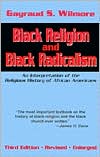

 |

|

The average rating for Black Religion and Black Radicalism: An Interpretation of the Religious History of African Americans based on 2 reviews is 3.5 stars.
Review # 1 was written on 2019-02-05 00:00:00 Bob Marton Bob MartonA very good historical analysis regarding early religions, the use of the church in activism and how it changed with trends and people over time. I really enjoyed it! |
Review # 2 was written on 2011-01-18 00:00:00 Diego Soto Diego SotoConsistently interesting and urgently narrated, Wilmore's book does not lack for ambition. It seeks a unified theory of Black religious history, predominantly in the United States, with Black Power as its defining note. For communities already committed to that ethical and political project, this book would probably be irreplaceable. Skeptics, however, are likely to walk away unconvinced. Wilmore is a compelling historian, theologically astute, with an ear for the telling quote. Any book so studded with excerpts from Du Bois and the King James Bible is setting a high standard of eloquence. With regard to his own rhetoric, Wilmore need not be ashamed of the company he has chosen. The text itself is readable and clear. I received it as a sort of counter-narration to the account Marla Frederick gives of the same material in her seminars. With that background, Wilmore's distinctive moves become more visible; and they are worth considering, although far from self-evident. The book's structure is somewhat misleading. Its opening chapter, on the African roots of Black Christianity, is also its weakest, tendentious and under-sourced, intervening in anthropologists' debates about the relevance of African religion to Black Christianity with an unearned theological certainty. Its final narrative chapters, by contrast-- on the Civil Rights movement, Black Power, and that movement's theological afterlife-- are thoroughly documented and convincingly argued. A movement scholar must, perhaps, pay tribute accordingly, and so in this case begin with the pharaohs and the Ethiopian eunuch. To simultaneously speak from within a movement and tell its history for a critical audience is a high ambition, one I would generally hope to see succeed. To make an argument like this one stick, Wilmore cannot rely on history alone. His project, though fundamentally interpretive, needs multiple empirical groundings. In fact, African-American Religious Studies has a history of producing polymaths who work across history, theology, sociology, and anthropology with skill and aplomb, producing work of equal sophistication and salience. In that regard, the field serves as a model to the study of religion as a whole. If Wilmore does not equal those successes here (and I judge he does not) he still provides a unique and useful text. Scholars who also want to be activists will find this book a helpful model. |
CAN'T FIND WHAT YOU'RE LOOKING FOR? CLICK HERE!!!